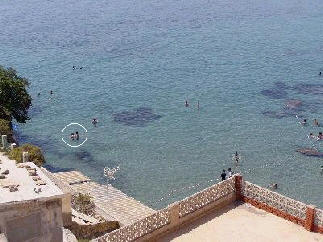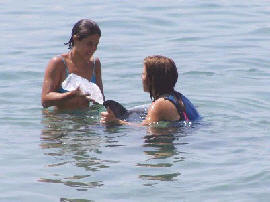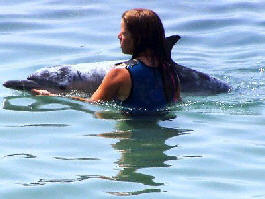|
Common dolphin stranding Almeria Spain
10th August 2003
Saturday 10th August. Location: Almeria,
Southern Spain. The beaches are packed to
capacity with tourists when local lifeguards
notice a dolphin swimming listlessly near
the shore. Immediate calls are put out to
PROMAR, the licensed marine animal
rescue organisation here in Almeria.
Locally trained PROMAR volunteers within the Lifeguard/Red Cross organisation already on duty in San Juan de los Tererros sprung into action. While they waited for PROMAR vets and emergency equipment to arrive from their headquarters at Centro Veterinario Equinac in Tabernas, the dolphin was supported beyond the surf line and faced out to sea by 2 people. Everyone else was kept well away to minimise stress and the beach was cordoned off. NOT an easy job to accomplish during August. A uniformed senior Red Cross official used a megaphone to keep inquisitive swimmers well away from the cordon that had been placed right around the dolphin. Guardia Civil and local police arrived on scene within minutes of the alert going out and ensured everyone cooperated fully.
I was on my way to lunch when I received the request to attend. Having only briefly met PROMAR officials neither of us knew much about the other. So when I arrived on the beach it was with some concern as to what I would find. All my worries quickly disappeared when I saw the officially marked cordon, uniformed Red Cross, Civil Defence, Guardia and local police guarding the dolphin who was clearly in good hands out at sea.
OK, so we have the dolphin in good hands, the
beach cordoned off and a Brit who no one
knows saying he was there to help…imagine the
same scene in the UK…and I don't speak the
language. Fortunately my Spanish partner
convinced the officials I had been asked to help.
So in I went….always one for a challenge!
The animal was a 1.5 metre female common dolphin. She had no external injuries, other than minor rake marks and 2 parasite lumps on her flank. Her body condition was good and I soon saw her digestive system was also working well, as I managed to collect a substantial, but normal, faecal sample. Respiration was 3-4 a minute and she had a very strong regular heartbeat. The only problem I could see was disorientation and a tendency to roll on her right side. I demonstrated to the lifeguards how to gently rock her and left the water, more at the insistence of the Guardia, who were now concerned this Brit was just another crazy animal lover who didn't know Flipper from Lassie. As things were clearly well under control I didn't argue (honest James!) and I waited on shore where I could keep her in view.
As soon as the PROMAR team arrived a portable tank was immediately erected and filled by the Fire Brigade who arrived from nearby Pulpi. All the equipment needed was quickly and efficiently unloaded from vehicles and stacked in an equipment dump at the side of the Red Cross cabin that had become our temporary HQ.
PROMAR vets Dr Emilio Guil, Eva Moron and myself inspected the dolphin again and found all was still OK. Lanolin was applied, blood samples and respiratory swabs were taken. Oral infusions, medication and even food was administered, without the need to force feed. The mouth seal was broken fish inserted and the dolphin actually swallowed herself. Volunteers were alternated regularly and we just sat back and waited for blood analysis results. As they began arriving it appeared the dolphin wasn't suffering from anything major, so we continued rocking and supporting her throughout the night. It was decided that to minimise stress she would remain in the sea but the portable pool was ready should it be needed.
Next morning (Sunday) it was decided to move to a more secluded area suggested by local volunteers. The dolphin was swum the few kilometres to the bay, accompanied by a lifeguard inflatable and supported by PROMAR volunteers. The move went well with the dolphin picking up speed on her own a couple of times.
Once in the new location a section of bay was netted
off and a sunshade erected. We then began trying to
remove support and allow her to swim free.
However the listing and disorientation continued
with limited bouts of free and energetic swimming.
By early evening total support was needed for the
majority of the time.
As the blood results were not giving any significant clue to the problem and both faecal and blowhole samples showed no parasite infestation, an Xray was organised for the following day. Fish with fresh water injected into it was fed at regular intervals. Medication continued, as did reduced bouts of free swimming. However the dolphin was now showing signs of physical deterioration behind the blowhole, at the base of the dorsal and pectoral fins. During the evening the heartbeat dropped so low in strength it was almost impossible to detect. This had happened the previous evening but strengthened with daylight. However, as her physical condition was also clearly deteriorating my concerns for her survival increased and were passed to the PROMAR team. It was then decided to send out a list of questions and requests for further information. This was done via BDMLR's vet James Barnett and other MARC contacts. MANY THANKS for the prompt responses folks…
As information began arriving throughout Sunday evening the dolphin's condition continued to deteriorate. Free swimming stopped, strength of heartbeat dropped lower and lower while the rate increased up to 160 a minute. Respiration remained constant between 3-5 per minute.
At 9am Monday morning the dolphin suddenly found strength from somewhere and shot away from volunteers. She went straight into the beach, the opposite direction she had constantly headed throughout the stranding. She hit the beach and died immediately.
Later in the day a full and detailed autopsy was carried out by Dr Emilio Guil. Further and more detailed laboratory tests are being carried out and more information is being received from around the world on this species of dolphin.
While the PROMAR team are feeling understandably dejected at the loss. It is clear their response, training and dedicated volunteers not only did a magnificent job, but they will be even more prepared the next time a live stranding occurs. To say I am impressed would be an understatement and you all know it takes a lot to impress me! So while this ends the report on the stranding in Spain I will be providing you all with more information on the sterling work PROMAR is undertaking here in Southern Spain.
This coming weekend a turtle with a part amputated flipper is being rehabilitated after lengthy medication and a proving period in a netted bay. If all goes well it will be radio tagged and released Monday. So look out for another report on the work of PROMAR.
Doug Cartlidge
BDMLR Medic
Top
|


